Module 6 A trip to the zoo Unit 3 Language in use 课件(共33张PPT)
文档属性
| 名称 | Module 6 A trip to the zoo Unit 3 Language in use 课件(共33张PPT) | 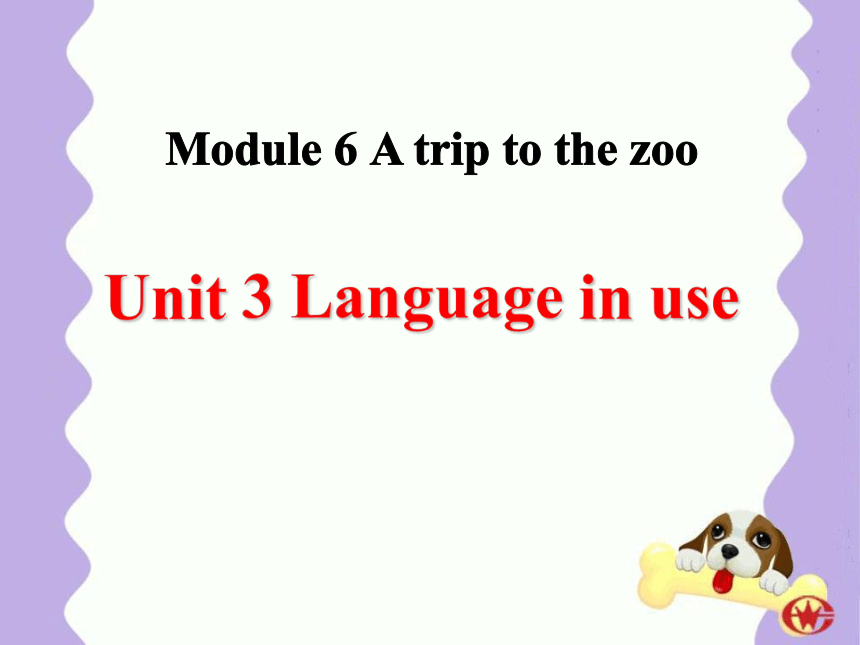 | |
| 格式 | zip | ||
| 文件大小 | 1.4MB | ||
| 资源类型 | 教案 | ||
| 版本资源 | 外研版 | ||
| 科目 | 英语 | ||
| 更新时间 | 2017-11-15 20:12:09 | ||
图片预览

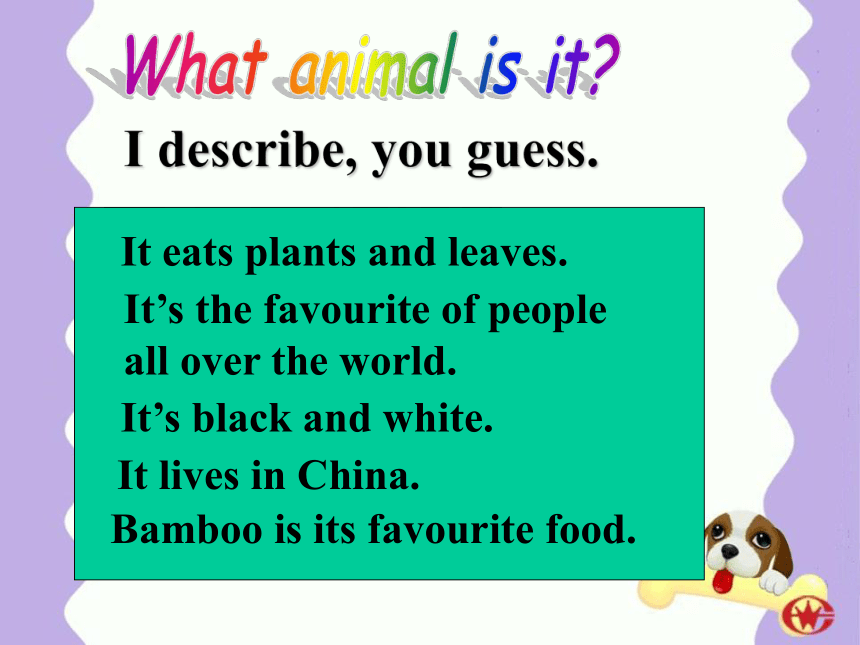
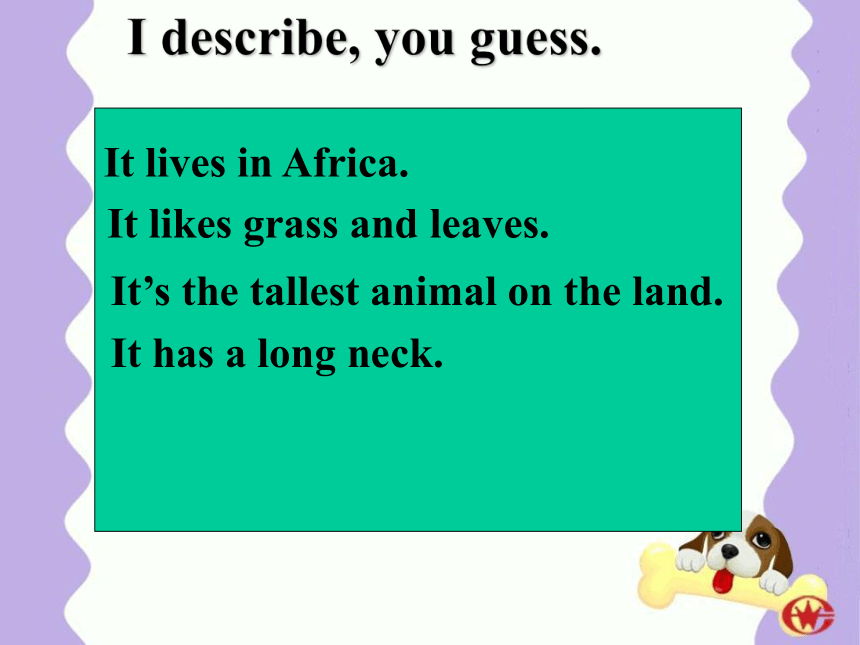
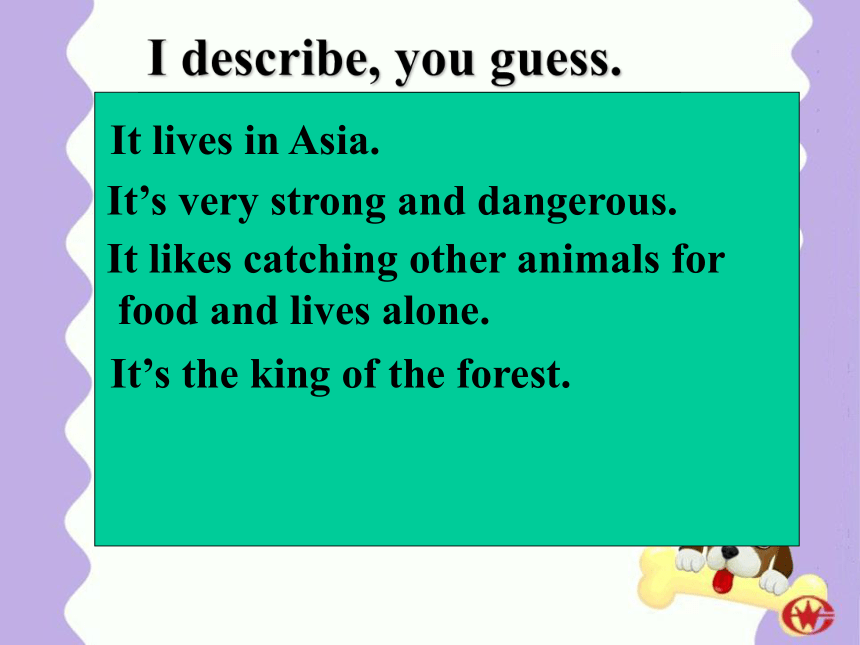
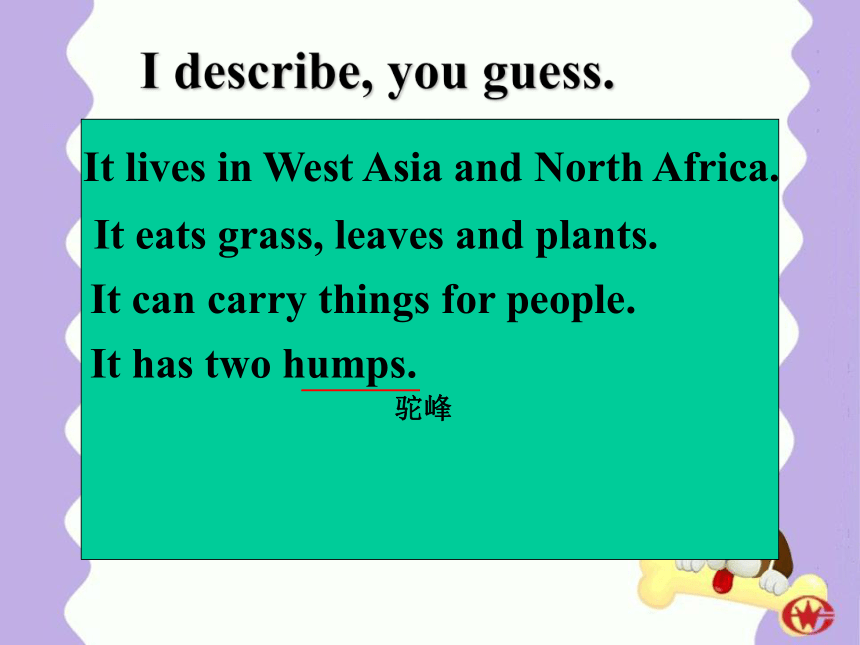
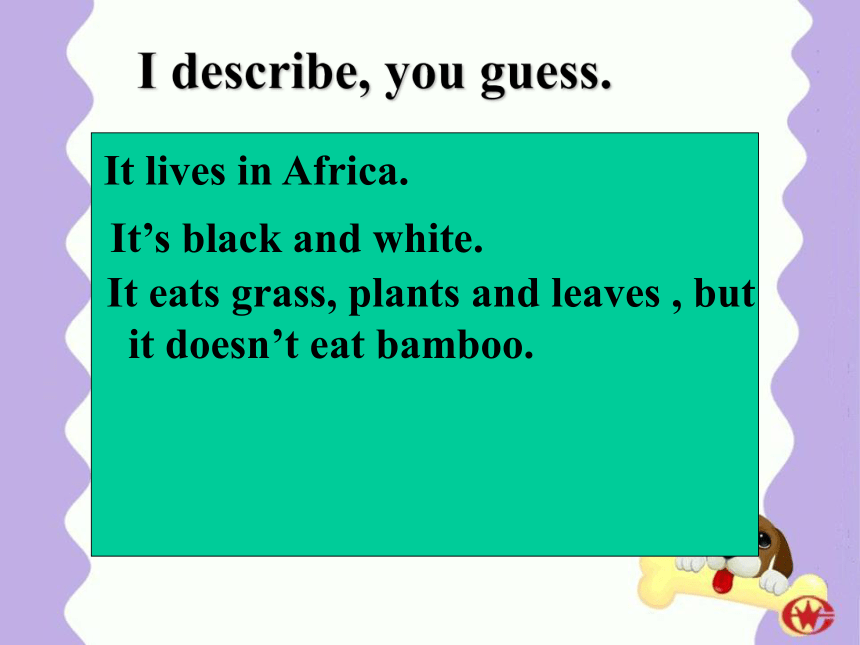
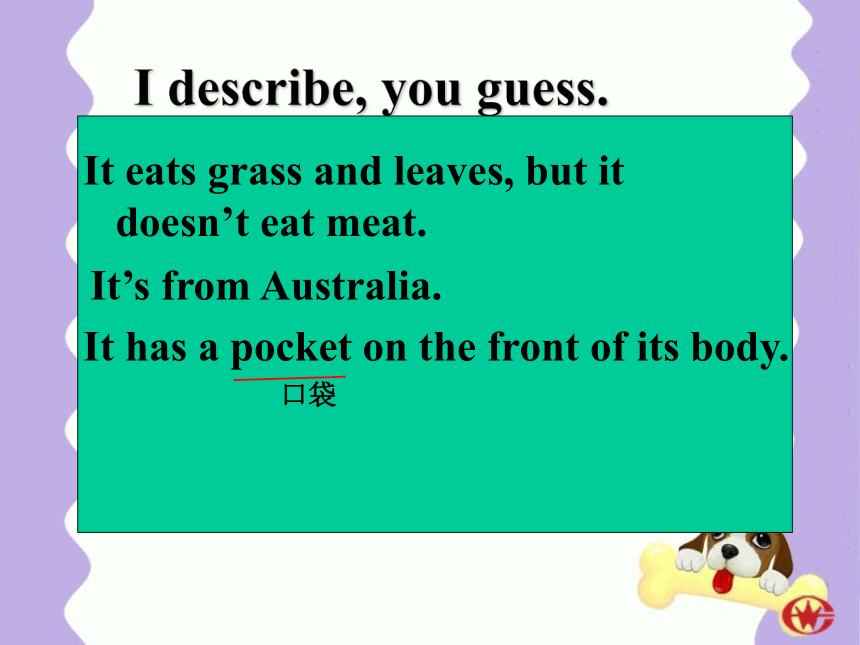

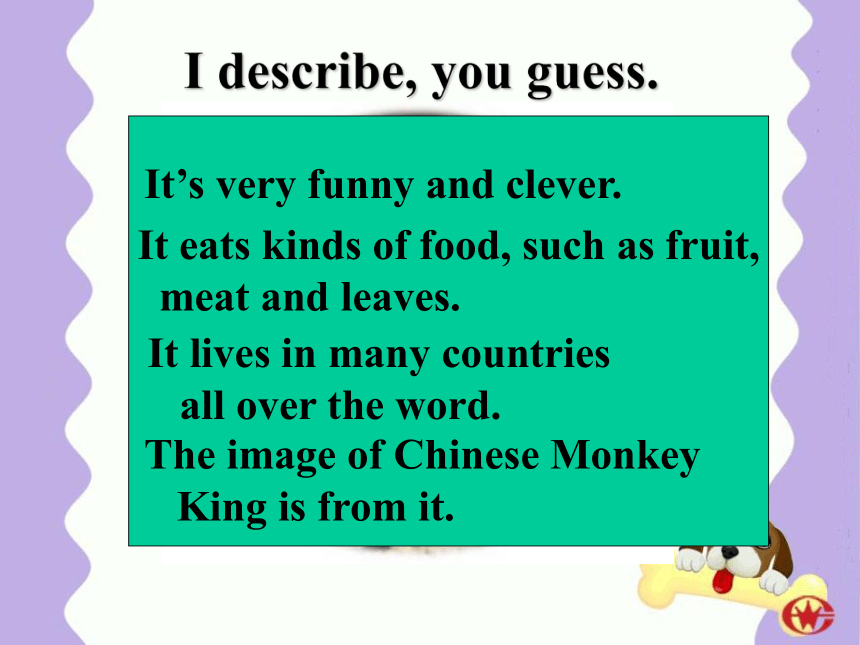

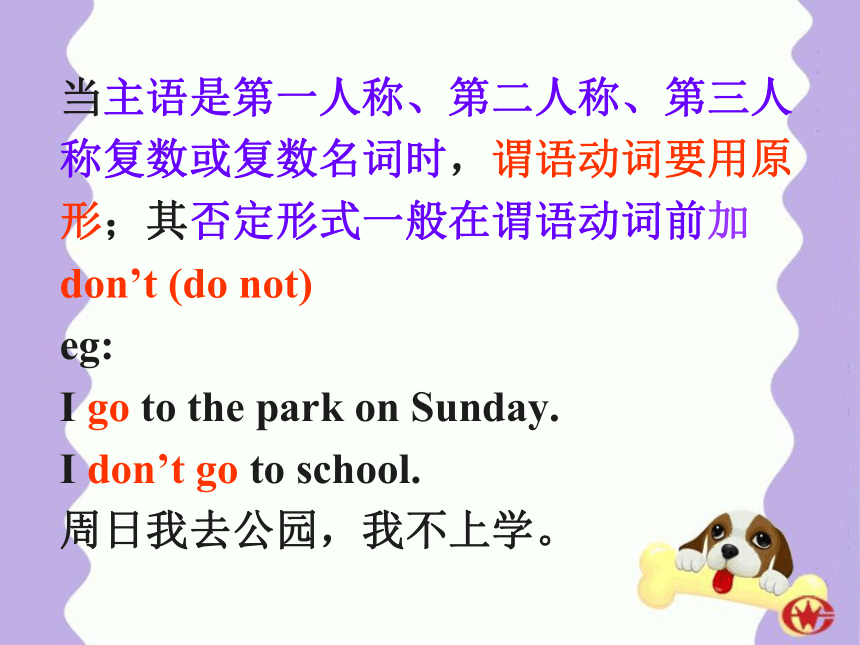

文档简介
课件33张PPT。
Unit 3 Language in useModule 6 A trip to the zooI describe, you guess.pandaWhat animal is it?It eats plants and leaves.It’s the favourite of people
all over the world.It’s black and white.Bamboo is its favourite food.It lives in China.giraffeI describe, you guess.It lives in Africa.It likes grass and leaves.It’s the tallest animal on the land.It has a long neck.tigerI describe, you guess.It lives in Asia.It’s very strong and dangerous.It likes catching other animals for
food and lives alone.It’s the king of the forest.camelI describe, you guess.It lives in West Asia and North Africa.It eats grass, leaves and plants.It can carry things for people.It has two humps.驼峰zebraI describe, you guess.It lives in Africa.It eats grass, plants and leaves , but
it doesn’t eat bamboo.It’s black and white.kangarooI describe, you guess.It eats grass and leaves, but it
doesn’t eat meat.It’s from Australia.It has a pocket on the front of its body.口袋elephantI describe, you guess.It comes from Asia.It’s very tall and strong.It can carry things for people.It likes water.It has a long nose.monkeyI describe, you guess.It’s very funny and clever.It eats kinds of food, such as fruit,
meat and leaves.It lives in many countries
all over the word.The image of Chinese Monkey
King is from it.1. 要表达经常性或习惯性的动作,要
使用一般现在时。如:
I do my homework in the evening.
我晚上做作业。
2. 要表示现在的状态,也可以用一般
现在时。如:
I know him very well.
我和他很熟。行为动词的一般现在时当主语是第一人称、第二人称、第三人
称复数或复数名词时,谓语动词要用原
形;其否定形式一般在谓语动词前加
don’t (do not)
eg:
I go to the park on Sunday.
I don’t go to school.
周日我去公园,我不上学。当主语是第三人称单数,表示经常性、
习惯性的行为时,我们这样表达:
She speaks English.
He lives far away from school.如果表示不常做某事,该怎样表达呢?她不说英语。
She doesn’t speak English.
他住地离学校不远。
He doesn’t live far away from school.你能总结出什么呢主语是第三人称单数的行为动词的一般
现在时否定形式是在行为动词前加
doesn’t (does not ),这时要注意把谓语动
词还原为动词原形。试比较肯定与否定
句中行为动词形式的变化:
肯定:He gets up very early.
他起床很早。
否定:He doesn’t get up very early.
他起床不很早。如果要问别人是否经常做某事,我们要 采用下面的表达方式:
—Does the panda eat meat?熊猫吃肉吗?
—No, it doesn’t. 不,它不吃。
—Does it eat bamboo? 它吃竹子吗?
—Yes, it does. 是的,吃。从以上例子可以看出,行为动词的第三
人称单数一般现在时疑问形式是在句首
加助动词does ,而加does之后,后面的
谓语动词像否定句一样也要用原形。
试比较:
肯定:He gets up very early.
他起床很早。
疑问:Does he get up very early?
他起床很早吗?肯定句:主语+动词的第三人称单数形式
否定句:主语+doesn’t +动词原形
疑问句:Does+主语+动词原形?
肯定回答:Yes, 主语+does.
否定回答:No, 主语+ doesn’t.现在把行为动词第三人称单数的各种
句式总结如下:Review--Does the monkey like fruit?Model----Yes, it does. Look and say.Name : Meimei
From: Yunnan, China
Favourite food: fruit 1 Work in pairs. --Does Meimei the elephant come from
Yunnan, China?-- Yes, it does.Name: Kingba
From: Asia
Favourite food: meat2 Complete the sentences with does or doesn’t. 1 ---_____ this panda come from China?
---Yes , it ______.
2 --- _____ this panda eat fish?
--- ____, it ______.
3 --- _____ this monkey like fruit?
--- Yes, it _____.
4 --- _____ this monkey live in Africa?
--- No, it ______.
5 --- The zebra ______ like meat.Doesdoes.No DoesDoesdoes.Doesdoesn’tdoesn’tdoesn’t3 Complete the passage with the correct
form of the words in brackets.My favourite animals______ (be) zebras. Look
at this one. It _____(be) cute. It ____(be) black
and white like the panda. But it ______ (do not)
come from Asia. It _____ (come) from Africa.
It ____(eat) grass.areisiscomeseatsdoesn’t4 Complete the word map.The world of animalsAsia Europe America giraffeAfrica zebraelephantmonkeypandatigerelephantmonkeymonkey Around the worldCamels
The camel lives in the deserts
of Africa and Asia and eats
grass. Some people think it
carries water in the humps
on its back, but it’s not true.
In fact, it’s fat.Kangaroo
The kangaroo is an Australia
animal. It eats grass and leaves, but it doesn’t eat meat. It carries its babies in a pocket on the front of its body. With its strong tail and back legs, the kangaroo jumps across
the grassland.polluting(污染) aircutting down treespolluting (污染) waterkilling animalsAre these behaviors(行为) good or bad?If we don’t protect(保护)them, we can’t see these lovely animals in the future (将来) .WritingWrite 5 sentences about your favorite animal.
Use the words you know.
Tell where it lives, what it looks like, what it likes to eat…Homework1 Write a short passage about
your favourite animals.
2 Make a poster of your favourite animals.1. The monkey _____ (like) bananas.
2. Lucy ___________ (not visit) Japan.
3. ____ Tiger ____ (live) in the wild in
China?
4. The worker _____ (give) the lion ten
kilos of meat a day.
5. Where ____ the wolf _____ (come)
from?一、 用括号内所给动词的适当形式填空。likesdoesn’t visitDoes live gives does comeQuiz6. The snake _________ ( come)
from America.
7. Snakes ________ (live) in Asia,
Africa, America, Australia and Europe.
8. The monkey _________ (eat) fruit.
9. Monkeys _________ (come) from
South America.
10. The wolf _________ (live) in the
European forests.comesliveeatscomelives1. My favourite animal is the elephant.
(对划线部分提问)
_____ _ your favourite animal?
2. Hand often goes to see his grandparents
on Saturdays.
(改为一般疑问句,并作否定回答)
____ Hand often __ to see his
grandparents on Saturdays?
No, he _______.二、 句型转换。What isDoes godoesn’t3. Our school has two thousand students.
(改为同义句)
_____ ___ two thousand students in
our school.
4. The panda is from China.
(改为同义句)
The panda ______ _____ China.
5. The tiger eats 5 kilos of meat a day.
(对划线部分提问)
____ _____ meat does the tiger eat a day?There arecomes fromHow muchidiomsLove me,love my________.[谚〕爱屋及乌。
He eats like a _______.他吃得很少。
Her husband is a real ________.她丈夫脾气确实坏。
Never offer to teach ______ to swim.不要班门弄斧。
You can take a ______ to water, but you can’t make
him drink.
牵马到水易,逼马喝水难。(即使给某人机会,他也不一定利用)。
She’s always as busy as a _______.她总是忙忙碌碌。 dogbirdbearfishhorsebee
Unit 3 Language in useModule 6 A trip to the zooI describe, you guess.pandaWhat animal is it?It eats plants and leaves.It’s the favourite of people
all over the world.It’s black and white.Bamboo is its favourite food.It lives in China.giraffeI describe, you guess.It lives in Africa.It likes grass and leaves.It’s the tallest animal on the land.It has a long neck.tigerI describe, you guess.It lives in Asia.It’s very strong and dangerous.It likes catching other animals for
food and lives alone.It’s the king of the forest.camelI describe, you guess.It lives in West Asia and North Africa.It eats grass, leaves and plants.It can carry things for people.It has two humps.驼峰zebraI describe, you guess.It lives in Africa.It eats grass, plants and leaves , but
it doesn’t eat bamboo.It’s black and white.kangarooI describe, you guess.It eats grass and leaves, but it
doesn’t eat meat.It’s from Australia.It has a pocket on the front of its body.口袋elephantI describe, you guess.It comes from Asia.It’s very tall and strong.It can carry things for people.It likes water.It has a long nose.monkeyI describe, you guess.It’s very funny and clever.It eats kinds of food, such as fruit,
meat and leaves.It lives in many countries
all over the word.The image of Chinese Monkey
King is from it.1. 要表达经常性或习惯性的动作,要
使用一般现在时。如:
I do my homework in the evening.
我晚上做作业。
2. 要表示现在的状态,也可以用一般
现在时。如:
I know him very well.
我和他很熟。行为动词的一般现在时当主语是第一人称、第二人称、第三人
称复数或复数名词时,谓语动词要用原
形;其否定形式一般在谓语动词前加
don’t (do not)
eg:
I go to the park on Sunday.
I don’t go to school.
周日我去公园,我不上学。当主语是第三人称单数,表示经常性、
习惯性的行为时,我们这样表达:
She speaks English.
He lives far away from school.如果表示不常做某事,该怎样表达呢?她不说英语。
She doesn’t speak English.
他住地离学校不远。
He doesn’t live far away from school.你能总结出什么呢主语是第三人称单数的行为动词的一般
现在时否定形式是在行为动词前加
doesn’t (does not ),这时要注意把谓语动
词还原为动词原形。试比较肯定与否定
句中行为动词形式的变化:
肯定:He gets up very early.
他起床很早。
否定:He doesn’t get up very early.
他起床不很早。如果要问别人是否经常做某事,我们要 采用下面的表达方式:
—Does the panda eat meat?熊猫吃肉吗?
—No, it doesn’t. 不,它不吃。
—Does it eat bamboo? 它吃竹子吗?
—Yes, it does. 是的,吃。从以上例子可以看出,行为动词的第三
人称单数一般现在时疑问形式是在句首
加助动词does ,而加does之后,后面的
谓语动词像否定句一样也要用原形。
试比较:
肯定:He gets up very early.
他起床很早。
疑问:Does he get up very early?
他起床很早吗?肯定句:主语+动词的第三人称单数形式
否定句:主语+doesn’t +动词原形
疑问句:Does+主语+动词原形?
肯定回答:Yes, 主语+does.
否定回答:No, 主语+ doesn’t.现在把行为动词第三人称单数的各种
句式总结如下:Review--Does the monkey like fruit?Model----Yes, it does. Look and say.Name : Meimei
From: Yunnan, China
Favourite food: fruit 1 Work in pairs. --Does Meimei the elephant come from
Yunnan, China?-- Yes, it does.Name: Kingba
From: Asia
Favourite food: meat2 Complete the sentences with does or doesn’t. 1 ---_____ this panda come from China?
---Yes , it ______.
2 --- _____ this panda eat fish?
--- ____, it ______.
3 --- _____ this monkey like fruit?
--- Yes, it _____.
4 --- _____ this monkey live in Africa?
--- No, it ______.
5 --- The zebra ______ like meat.Doesdoes.No DoesDoesdoes.Doesdoesn’tdoesn’tdoesn’t3 Complete the passage with the correct
form of the words in brackets.My favourite animals______ (be) zebras. Look
at this one. It _____(be) cute. It ____(be) black
and white like the panda. But it ______ (do not)
come from Asia. It _____ (come) from Africa.
It ____(eat) grass.areisiscomeseatsdoesn’t4 Complete the word map.The world of animalsAsia Europe America giraffeAfrica zebraelephantmonkeypandatigerelephantmonkeymonkey Around the worldCamels
The camel lives in the deserts
of Africa and Asia and eats
grass. Some people think it
carries water in the humps
on its back, but it’s not true.
In fact, it’s fat.Kangaroo
The kangaroo is an Australia
animal. It eats grass and leaves, but it doesn’t eat meat. It carries its babies in a pocket on the front of its body. With its strong tail and back legs, the kangaroo jumps across
the grassland.polluting(污染) aircutting down treespolluting (污染) waterkilling animalsAre these behaviors(行为) good or bad?If we don’t protect(保护)them, we can’t see these lovely animals in the future (将来) .WritingWrite 5 sentences about your favorite animal.
Use the words you know.
Tell where it lives, what it looks like, what it likes to eat…Homework1 Write a short passage about
your favourite animals.
2 Make a poster of your favourite animals.1. The monkey _____ (like) bananas.
2. Lucy ___________ (not visit) Japan.
3. ____ Tiger ____ (live) in the wild in
China?
4. The worker _____ (give) the lion ten
kilos of meat a day.
5. Where ____ the wolf _____ (come)
from?一、 用括号内所给动词的适当形式填空。likesdoesn’t visitDoes live gives does comeQuiz6. The snake _________ ( come)
from America.
7. Snakes ________ (live) in Asia,
Africa, America, Australia and Europe.
8. The monkey _________ (eat) fruit.
9. Monkeys _________ (come) from
South America.
10. The wolf _________ (live) in the
European forests.comesliveeatscomelives1. My favourite animal is the elephant.
(对划线部分提问)
_____ _ your favourite animal?
2. Hand often goes to see his grandparents
on Saturdays.
(改为一般疑问句,并作否定回答)
____ Hand often __ to see his
grandparents on Saturdays?
No, he _______.二、 句型转换。What isDoes godoesn’t3. Our school has two thousand students.
(改为同义句)
_____ ___ two thousand students in
our school.
4. The panda is from China.
(改为同义句)
The panda ______ _____ China.
5. The tiger eats 5 kilos of meat a day.
(对划线部分提问)
____ _____ meat does the tiger eat a day?There arecomes fromHow muchidiomsLove me,love my________.[谚〕爱屋及乌。
He eats like a _______.他吃得很少。
Her husband is a real ________.她丈夫脾气确实坏。
Never offer to teach ______ to swim.不要班门弄斧。
You can take a ______ to water, but you can’t make
him drink.
牵马到水易,逼马喝水难。(即使给某人机会,他也不一定利用)。
She’s always as busy as a _______.她总是忙忙碌碌。 dogbirdbearfishhorsebee
同课章节目录
- Starte
- Module 1 My teacher and my friends
- Module 2 My English lesson
- Module 3 My English book
- Module 4 My everyday life
- Module 1 My classmates
- Unit 1 Nice to meet you.
- Unit 2 I'm Wang Lingling and I'm thirteen years ol
- Unit 3 Language in use.
- Module 2 My family
- Unit 1 Is this your mum?
- Unit 2 These are my parents.
- Unit 3 Language in use.
- Module 3 My school
- Unit 1 There are thirty students in my class.
- Unit 2 The library is on the left of the playgroun
- Unit 3 Language in use.
- Module 4 Healthy food
- Unit 1 We've got lots of apples.
- Unit 2 Is your food and drink healthy?
- Unit 3 Language in use.
- Module 5 My school day
- Unit 1 I love history.
- Unit 2 We start work at nine o'clock.
- Unit 3 Language in use.
- Revision module A
- Module 6 A trip to the zoo
- Unit 1 Does it eat meat?
- Unit 2 The tiger lives in Asia.
- Unit 3 Language in use.
- Module 7 Computers
- Unit 1 How do I write my homework on the computer?
- Unit 2 When do you use a computer?
- Unit 3 Language in use.
- Module 8 Choosing presents
- Unit 1 I always like birthday parties.
- Unit 2 She often goes to concerts.
- Unit 3 Language in use.
- Module 9 People and places
- Unit 1 We're enjoying the school trip a lot.
- Unit 2 They're waiting for buses or trains.
- Unit 3 Language in use.
- Module 10 Spring Festival
- Unit 1 Are you getting ready for Spring Festival?
- Unit 2 My mother's cleaning our houses and sweepin
- Unit 3 Language in use.
- Revision module B
